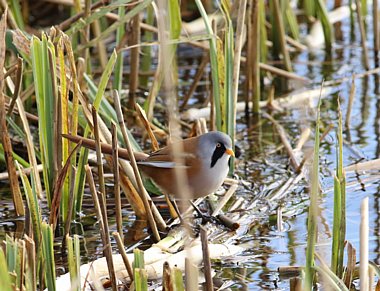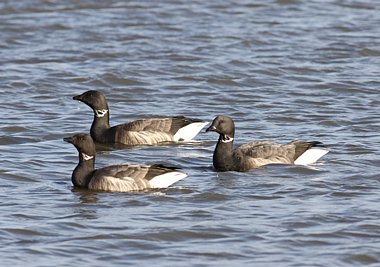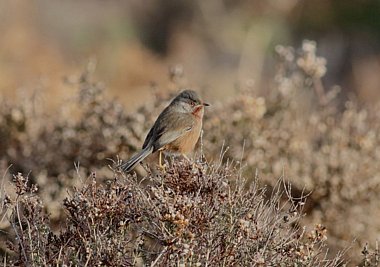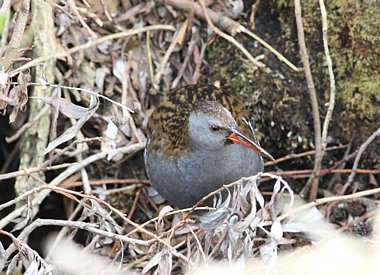NEW! Winter Birdlife of Devon & Dorset
Excellent winter birding, including some difficult and sought after UK species
| Destination | |
|---|---|
| Focus | |
| 2026 Dates | |
| Duration | 8 Days |
| Guides | |
| 2026 Price | £2295 pp £320 single supplement. Deposit £300 |
| Max Group Size | 7 per guide |
Dorset and Devon are classic and exciting destinations for winter wildlife. The abundance of habitats and milder, local climate combine perfectly to offer a haven for overwintering divers, grebes, winter duck and waders, as well as some sought-after residents. Our flexible two-centred itinerary is designed to maximise our lists, even though the pace will be relaxed and walking will be fairly easy.
Our unique holiday starts at Poole in Dorset, where we devote two full days exploring Thomas Hardy country. With a superb choice of scenic locations and habitats ranging from cliffs, woodland, heathland, dunes, farmland, reedbeds and estuary, each will provide plenty of birding highlights. Slavonian and Black-necked Grebe both winter in Poole Harbour, as do Dark-bellied Brent Goose and a few Spotted Redshank while White-tailed Eagle has become a recent resident! We take the ferry to the remarkable and peaceful Brownsea Island, home to Spoonbill, Avocet, and a population of Red Squirrel. We look for Hen Harrier and Merlin over the heathland, and at Arne, visit one of the country’s premier nature reserves for Dartford Warbler and Woodlark. Other passerine targets include Black Redstart, Bearded Reedling and Cetti’s Warbler, the latter two a strong possibility at Weymouth during a break in our transfer to Devon.
Cirl Bunting is an important range-restricted species found solely in south-west England, and the Devon coastline is one of the best places to find them. Other winter scarcities can include Siberian Chiffchaff, Yellow-browed Warbler, Water pipit and Snow Bunting with Short-eared Owl another possibility. We join a birdwatching cruise along the regionally important River Exe - an unforgettable experience allowing us to truly immerse ourselves in a range of birdlife. Wildfowl, waders, herons, grebes, divers and gulls will again feature, and other highlights may include displaying Goshawk and Hawfinch in the forest. Unusual birds often appear and we also visit quiet riverside sites to look for Beaver, in an area where they are beginning to gain a foothold.
Saturday – Meet at Poole and birding around Poole Harbour
Our holiday starts at Poole in Dorset, where your Heatherlea guide will collect train travellers from the station at 1pm and meet other participants at our comfortable hotel shortly after. Once settled, we make a gentle start at nearby Poole Harbour, selecting a site depending on the state of the tide. Situated on its north side, Lytchett Fields is one such place where we might begin. A site where heathland naturally transforms into reedbed, then saltmarsh, as it once did throughout Poole Harbour before widespread urbanisation. At high tide waders take refuge and roosting here, Dunlin, Knot, Redshank, Greenshank, Bar-tailed Godwit, Curlew, Snipe and Lapwing all being regular. These attract raptors, Marsh Harrier and Peregrine the most likely and among recent rarities, Water Pipit has occurred regularly. We stay at in the Poole area for three nights
Sunday - Brownsea Island
We take the ferry to this remarkable and peaceful island, a truly wild place just a mile or two from busy Bournemouth and Poole. Exploring on foot, we visit the lagoons home to Spoonbill, Little Egret, Avocet and numerous other species of wader. Large numbers of Dark-bellied Brent Geese can be seen almost anywhere within Poole harbour, and other likely wildfowl includes Shelduck, Pintail, Shoveler often accompanied by roosting waders such as Grey Plover, Black-tailed Godwit and a few Spotted Redshank. Recently introduced White-tailed Eagle to the area can often be found on Brownsea, and in quiet corners, Water Rail may be heard and may be seen from the bird hide. The island is home to a population of Red Squirrels, and we look for these as we explore the woods on the Dorset Wildlife Trust side of the island, perhaps seeing resident Sika Deer too.
Returning to the Mainland, we may have time to investigate one of the sites close to the ferry port. Holes Bay can be a good place for wildfowl, waders and large numbers of Mediterranean Gull gather here. At nearby Upton Country Park, a walk in the woods will likely yield Green Woodpecker, Nuthatch and Treecreeper. Occasional Chiffchaff and Firecrest winter here too, and views of the Holes Bay salt-mash where wildfowl and waders may be seen, birders can enjoy the best of both worlds at this lesser-known birding site.
Monday - Isle of Purbeck
Exploring the southern shore of Poole Harbour and the open sea of Studland Bay, we look for divers, grebes and sea duck. An important wintering area for Black-necked Grebe, occasional Slavonian Grebe join them offering the perfect chance to compare. Great Northern Diver are often present too, alongside Common Scoter, Red-breasted Merganser and Long-tailed Duck. On the open heath, we can look out for raptors, with Hen Harrier and Merlin sometimes seen. Brands Bay and Durlston Head are other likely stopping points, while the Little Sea Lagoon at Studland offers the chance of something unusual. We have lots of birding options on Purbeck. Durlston Country Park sometimes has overwintering Black Redstart, and at Arne we will be visiting one of Dorset’s top birdwatching spots. With many habitats, we may prioritise the heathlands where Dartford Warbler and returning Woodlark may be found.
Tuesday – Portland and transfer west to Devon
Transferring via West Dorset, we have every chance to increase our bird list by spending the day exploring the Weymouth area. And with numerous, good birdwatching sites within striking distance of one another we have lots of options. Radipole Lake in the very heart of Weymouth is a mosaic of scrub and reedbeds, the latter home to the sought-after Bearded Reedling. A reserve with good access, other resident birds include Cetti’s Warbler, Kingfisher and Water Rail while resent surprises have included overwintering Iceland Gull and Bittern. At Lodmoor, the combination of a large reedbed, open water, saltmarsh, wet grassland and bushes attracts the same species, as well as gulls, ducks and waders at high tide. Portland Bill jutting out six miles into the English Channel, is one of the most famous migration watch-points in the UK, and is also a good place to see wintering Purple Sandpiper and Black Redstart. You can’t drive past Portland Harbour and Ferrybridge without stopping to scan for birds either. A real hotspot for overwintering wildfowl, divers, auks with Slavonian and Black-neck Grebe real possibilities. A site with a long rarity list, Brunnich’s Guillemot, Little Auk and Surf Scoter are among those featuring, while a strong contender for Holboll’s (American) Red-necked Grebe was recorded here recently too. We’ll have certainly had a full day’s birding before we head to Devon where we stay for the next four nights.!
Wednesday – Exe Estuary birding cruise
Our second base puts us within easy access of some beautiful coastline and superb birdwatching sites, including birdwatching from a boat in the River Exe. A regionally important site for its overwintering waders and wildfowl, it is a SSSI (Site of Special Scientific Interest) reserve, partly designated for its bird populations. We join a birdwatching cruise along the Exe, an unforgettable experience, allowing us to truly immerse ourselves in a range of wildlife - but from a different perspective! Likely birds include Dark-bellied Brent Goose, Shelduck, Wigeon, Pintail, Red-breasted Merganser, Avocet, Golden and Grey Plover, Black-tailed and Bar-tailed Godwit, Greenshank, Knot and other waders, plus Little and Cattle Egret with chances of wintering Spoonbill and plenty more besides! Our cruise will last just over 2 hours, so we will have time to also visit the RSPB reserves of Bowling Green Marsh, near Topsham today, or perhaps Exminster and Powderham Marshes across the river which also boast great winter birding! In the evening, we may also explore some sites for European Beaver which has an increasing population in East Devon.
Thursday – Tor Bay and Slapton Ley
Often dubbed the ‘English Riviera’, at Tor Bay we will be on the trail of Cirl Bunting - a species whose recovery after huge long term national declines is largely due to the efforts of the RSPB working with local farmers. We plan to check some of the hotspots for this important species, helped by the bird feeding stations and if successful, may also venture out to nearby Berry Head. A place where rarer species can sometimes linger during the winter, divers and seabirds will be on the cards again while Pomarine Skua overwintered in the past. Continuing south along the coast, after negotiating the River Dart we eventually come to Slapton Ley. An unusual freshwater lake separated from the sea by a shingle ridge, it is also a designated SSSI. With a variety of habitats including reedbeds, and farmland it can be a great site for waterfowl with Ring-necked Duck, Smew, Greater and Lesser Scaup recorded recently.
Friday – Haldon Forest and Dawlish Warren
Our final day, and in a change of scenery, the Forestry Commission viewpoint at Haldon can be a good place to watch displaying Goshawk in late winter. Hawfinch are also regularly seen here, and we can spend the morning walking the trails hoping to connect with these enigmatic and other woodland birds. At Dawlish Warren situated at the mouth of the Exe Estuary, the sand spit, pools and mixed scrub are an ideal place to look for scarce overwintering birds such as Black Redstart and Siberian Chiffchaff. The hightide wader roost can be busy, and scanning offshore we have further chances of divers, grebes and sea duck. Rarer species are often seen, with Water Pipit, Short-eared Owl and Snow Bunting sometimes occurring in winter.
Saturday – Departure from Exeter or Poole
After completing our final checklist on Friday evening, we breakfast together as a group for the last time and then drive back to Poole, via Exeter Railway station for those departing there. Otherwise, we will return everyone to their cars at Poole Station, our tour expecting to conclude around 1pm.
Please note: all itineraries are given as a guide only. Actual holiday content may vary according to the judgement of your guide, and elements beyond our control (eg weather).
What's included in your holiday price
- Seven nights comfortable en-suite hotel accommodation. We choose from our personally inspected shortlist, where birders are welcome and the hospitality is special. Guests are never expected to share. All rooms are en-suite. Full details with your joining pack.
- Full English breakfast and dinner from Saturday evening till Friday morning, packed lunch each day from Sunday to Thursday.
- Exe estuary cruise and boat trip to Brownsea Island.
- All entrance fees for reserves.
- All transport by comfortable minibus.
- Guidance from a professional Group Leader.
What's not included in your holiday price
- Travel to Poole or Exeter Train Station, or any other agreed meeting point.
- Insurance, drinks and other items of a personal nature.
Field Notes
Expect a wide variation in weather conditions, which can be wild and unpredictable, with temperatures perhaps averaging around 8 degrees Celsius. Sunshine, rain and strong winds are all possible, and you will probably experience a bit of everything. Biting insects are not expected. Please bring waterproof walking boots or shoes, weatherproof clothing and a small rucksack. Exposed coastal locations and boat trips can be cold at any time of year if the wind picks up, please pack accordingly. The holiday will be run at a relaxed pace, with time for photography and general wildlife as well as fabulous birdwatching in a spectacular setting! There will be short to moderate (1 to 3 mile) walks most days, mainly on well walked tracks and paths with nothing over strenuous but a reasonable level of health would be an advantage.
Travel
Easily accessible by car with good road and rail connections to Poole or Exeter. Any questions please just contact the office.
Other birding and wildlife holidays in Southern England
- Isles of Scilly for birders
- Cornwall in Spring
- Forest of Dean and Somerset Levels
- Isles of Scilly in Spring
- West Cornwall in Autumn for birders
Why choose Heatherlea for your birding and wildlife holiday?
Heatherlea is one of Britain's leading wildlife holiday operators. In 2019 we celebrate our 29th Anniversary with more choice than ever, both in Scotland and overseas. Relax and enjoy yourself, as we do all the planning! Above all, we make it our business to show key wildlife to you. Our fully inclusive guided holidays concentrate on the real experience, and we take time to ensure that each of our guests enjoys everything we do.
- We have been organising birding and wildlife holidays for 30 seasons, and have a highly experienced and capable office team. We also offer a telephone and email service outside normal office hours.
- We are a small company, run BY birders FOR birders. Come and see!
- Heatherlea are Mainland Scotland’s FIRST ‘5-Star Wildlife Experience!’ This is the highest available grading, classified as ‘exceptional’ by visitScotland.
- Heatherlea hold full Tour Operator Insurance for your added protection.
- Heatherlea is a limited company, registered in Scotland. We are also registered to pay VAT, which is included in your holiday price as quoted on this page.
- Once your holiday is confirmed in writing by us, we promise not to surcharge the price for any reason.
Trip Reports
Coming Soon




